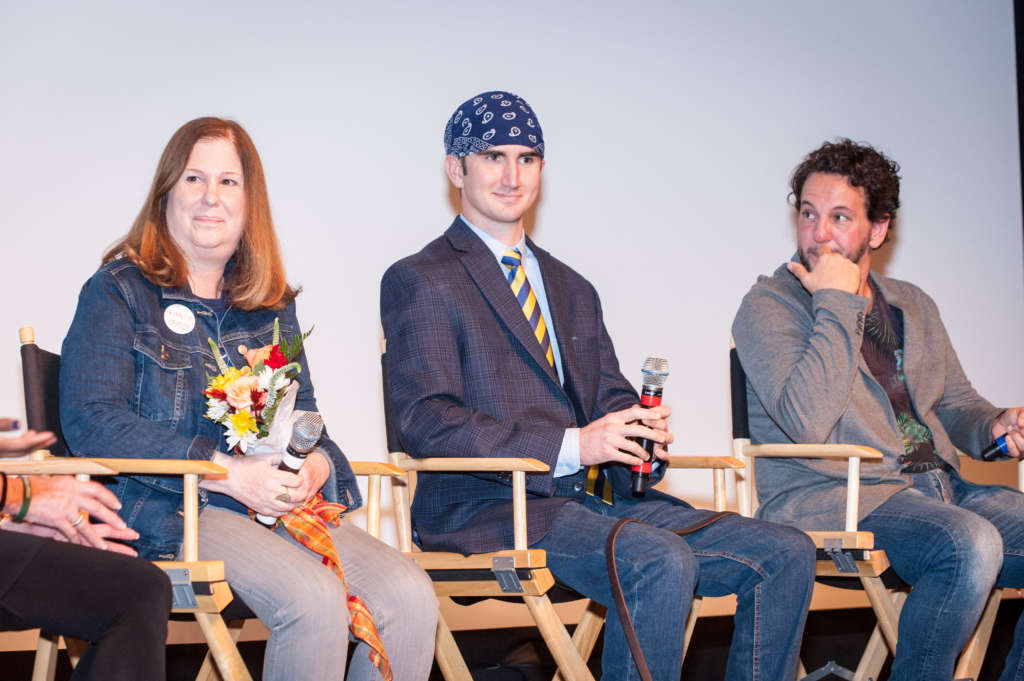WASHINGTON — Tom Sweitzer’s voice fills the quiet hallway of 8 North Jay St. in Middleburg, Virginia.
“Oh beautiful for spacious skies.”
A piano kicks in to guide the next line.
“For amber waves of …”
Sweitzer pauses and waits for someone to come in with the next word. It takes a little bit of coaxing, but eventually an older man in the room makes out the word “grain” with a shaky voice.
“Good!” Sweitzer says before continuing with the song.
The man he’s coaching suffered a stroke several months ago and is working to regain his speech and mobility. Music is one way he’s doing that.
“One of the greatest things about music therapy is it disguises just therapy,” said Sweitzer, who co-founded the Middleburg-based music therapy center A Place to Be eight years ago.
“It is the evidence-based clinical modality that uses music in whatever portal formation you need to to help a human being.”
The center’s list of clients runs the gamut from toddlers with down syndrome who are working to strengthen the muscles around the mouth — a little bit of “kazoo therapy” helps to achieve the goal, Sweitzer explained — to adults dealing with depression and teens battling bullying.

“We write a lot of original music here where people are trying to work through their struggles in life,” Sweitzer said, pointing to a whiteboard that had the words, “No one to poke fun of me, lots of generosity,” scribbled in red marker.
There’s a choir comprised of stroke survivors and middle school groups that meet to connect in a positive, arts-based environment. Sweitzer also works with nonverbal individuals and gives them ways to communicate through music.
“We see developmental disabilities, we see intellectual disabilities, we see cognitive, emotional, behavioral needs,” Sweitzer said. “We have a different definition of disability here. Our definition is anything at all that holds a person back from living life to its fullest.”
Seven years ago, then 18-year-old Forrest Allen’s life came to a standstill — and almost to an end — when a snowboarding accident left him in a coma with a traumatic brain injury. When Allen woke up, he was unable to speak or move.
Along with a team of speech therapists and physical therapists, Sweitzer started working with Allen on his road to recovery. A few months after his accident, the teen gained some mobility in his arms and typed a message to Sweitzer on his device. It said, “Help me find my voice.”
It was nearly two years after his accident, but eventually, Allen found his voice through music. Sweitzer led him through breathing exercises that turned into humming, which eventually turned into singing.
“That is probably one of the most profound moments of music therapy I have ever experienced,” Sweitzer said about the years he worked with Allen.
Last fall, Sweitzer and Allen appeared on screen alongside Oscar contenders such as “Lady Bird” and “Call Me By Your Name,” when a film documenting their journey, called “Music Got Me Here,” played at the Middleburg Film Festival.
“Forrest is really a miracle, and watching somebody throughout six and a half years — from being in a coma for months to being this person who goes into schools and inspires and motivates people, and reminds them to wear their helmet,” Sweitzer said.
Not all the work of a music therapist involves helping people enhance and prolong their lives. Sometimes, it’s about helping them let go. Last week, 22-year-old music therapy intern Nathan Chuba was called to the hospital to work with a patient in his final hours of life.
Next to his bed, Chuba played some of the patient’s favorite songs on his guitar to calm his ragged and elevated breathing. Eventually, he slowed the music to relax the breathing even more so that the patient was in a more peaceful and tranquil state before he passed away.
“It’s an amazing experience to be a part of something like that and to know that you can send someone off with some music in a much better place,” Chuba said.
***
Back at A Place to Be, Sweitzer and his staff get one of their rooms ready for that evening’s program: “Friday Night Guys.”
For 90 minutes, a group of young men, ages 12 to 20, work on coping skills and self-expression. Most in the group have autism or an intellectual or cognitive disability.
Tuesdays, the room is reserved for girls, ages 15 and up. Together, and with music, they can open up about difficulties they’re encountering in life. Sweitzer said in groups such as these, a drum circle is the best icebreaker.
“For a lot of teenagers, that works better than trying to talk. And then, what happens is they’re enjoying in this moment where they’re all making some loud, funky fun music and usually sprouting from that is laughter. And then, we’re in a different place and we can go for something different, clinically or therapeutically,” Sweitzer said.
“See, music can also just create this place where you’re doing therapy but there’s joy. It’s a safe space where they can talk about something they’re hiding inside.”







